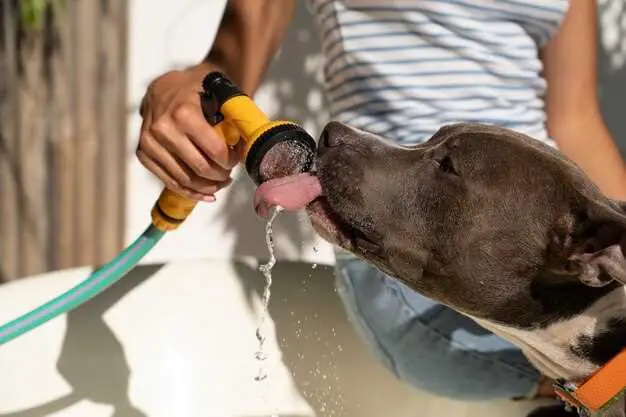
Peanut butter and honey are two popular foods that many people enjoy. But can dogs eat peanut butter with honey?
The short answer is yes, dogs can eat peanut butter with honey in moderation. Both peanut butter and honey can be safe and healthy treats for dogs, but it’s important to give them in the right amounts and to watch out for any potential allergies or digestive issues.
Peanut butter is a great source of protein and healthy fats for dogs. It can be a tasty and nutritious addition to their diet. Honey, on the other hand, provides natural sugars and antioxidants.
However, it’s important to note that not all peanut butter and honey products are safe for dogs. Some brands may contain additives, preservatives, or xylitol, all of which can be harmful to dogs. Make sure to read the labels and choose a peanut butter and honey that are free from any harmful ingredients.
When giving your dog peanut butter with honey, start with small amounts and monitor their reaction. If your dog shows any signs of allergies, such as itching, vomiting, or diarrhea, stop giving them this treat and consult with your veterinarian.
In conclusion, dogs can enjoy peanut butter with honey as an occasional treat. Just make sure to choose a safe and natural product, give it in moderation, and watch out for any adverse reactions. Your furry friend will surely appreciate this delicious and healthy snack!
Dogs and Peanut Butter: Benefits and Precautions
Peanut butter is a popular treat for dogs, and it can offer several benefits. However, it is important to exercise caution and consider some precautions when feeding your furry friend this delicious spread. Here we will discuss the benefits of giving peanut butter to dogs and the precautions you should take to keep them safe and healthy.
| Benefits | Precautions |
|---|---|
|
1. Source of Protein: Peanut butter is rich in protein, which is essential for dogs’ overall health and muscle development. |
1. Allergies: Some dogs may be allergic to peanuts or develop a negative reaction. Always start with a small amount and observe for any signs of allergies, such as itching, vomiting, or diarrhea. |
|
2. Healthy Fats: Peanut butter contains healthy fats that can contribute to your dog’s shiny coat and help maintain a healthy weight. |
2. High Calorie Content: Peanut butter is high in calories and can lead to weight gain if given in excess. Limit the amount you give based on your dog’s size and activity level. |
|
3. Mental Stimulation: Using peanut butter as a treat can provide mental stimulation for dogs. It can be used as a filling for puzzle toys or to distract them during grooming or vet visits. |
3. Xylitol: Make sure the peanut butter you give to your dog does not contain xylitol, a sweetener harmful to dogs. Always check the label to ensure it is xylitol-free. |
When choosing peanut butter for your dog, opt for natural varieties without added sugars, salt, or hydrogenated oils. These additives can be harmful to dogs and undermine the health benefits of the peanut butter. Additionally, always feed peanut butter in moderation and consider it as an occasional treat rather than a daily staple in their diet.
Remember, every dog is unique, and some may have individual dietary restrictions or sensitivities. If you have any concerns or questions about feeding peanut butter to your dog, consult with your veterinarian for personalized advice.
Nutritional Benefits of Peanut Butter for Dogs
Peanut butter is not only a delicious treat for dogs, but it also offers several key nutritional benefits. Here are some reasons why peanut butter can be a healthy addition to your furry friend’s diet:
1. Healthy Fats: Peanut butter is packed with healthy fats, such as monounsaturated fats, that are beneficial for dogs. These fats can promote a shiny coat, healthy skin, and provide a source of energy.
2. Protein: Peanut butter is an excellent source of protein for dogs. Protein is essential for maintaining and building strong muscles, supporting the immune system, and repairing tissues.
3. Vitamins and Minerals: Peanut butter contains various vitamins and minerals that are essential for dogs. These include vitamin E, vitamin B, niacin, and magnesium. These nutrients support overall health and can contribute to a well-balanced diet.
4. Antioxidants: Peanut butter contains antioxidants, such as resveratrol, that can help protect against the damaging effects of free radicals in a dog’s body. These antioxidants have anti-inflammatory properties and can support heart health.
5. Mental Stimulation: Peanut butter can be a great mental stimulation tool for dogs. The act of licking peanut butter from a toy or spoon can provide dogs with a fun and engaging activity, keeping them mentally stimulated and occupied.
While peanut butter can provide nutritional benefits for dogs, it’s important to choose a variety that does not contain added sugars, xylitol, or artificial sweeteners, as these can be harmful to dogs. Always check the label and consult with your veterinarian before introducing peanut butter into your dog’s diet.
The Risks of Feeding Dogs Peanut Butter
While peanut butter can be a tasty treat for dogs, it is important to be aware of the potential risks involved. One of the main concerns is the high fat content in peanut butter. Dogs that consume too much fat can experience digestive upset, including diarrhea and stomach discomfort.
Another risk is the presence of xylitol in some peanut butter brands. Xylitol is a sugar substitute that is safe for humans but highly toxic to dogs. Even small amounts of xylitol can cause a rapid release of insulin in a dog’s body, leading to a dangerous drop in blood sugar levels.
Peanut butter can also pose a choking hazard, especially if it is given to dogs in large quantities or in sticky form. Dogs that have a tendency to gulp down their food without chewing it properly are particularly at risk. Choking on peanut butter can lead to respiratory distress and may require immediate veterinary intervention.
Lastly, some dogs may have allergies or sensitivities to peanuts, which can cause adverse reactions such as itching, redness, or swelling. If your dog has any known allergies or sensitivities, it is best to avoid feeding them peanut butter altogether.
In conclusion, while peanut butter can be a tasty occasional treat for dogs, it is important to be aware of the potential risks. It is always recommended to consult with your veterinarian before introducing any new foods into your dog’s diet to ensure they are safe and appropriate.
Introducing Peanut Butter with Honey to Dogs
When it comes to treats for dogs, peanut butter is a classic favorite. But have you ever considered adding a touch of sweetness by combining peanut butter with honey? It might sound like the perfect guilty pleasure for us humans, but is it safe for our furry friends?
The good news is that both peanut butter and honey can be safe for dogs to consume in moderation. Peanut butter is a great source of healthy fats, protein, and vitamin E, while honey is a natural sweetener that can provide a boost of energy. However, it is important to keep a few things in mind when introducing peanut butter with honey to your dog’s diet.
Firstly, you should always check the ingredients list of the peanut butter and honey to ensure that they do not contain any harmful additives such as xylitol, which can be toxic to dogs. It is also essential to choose natural and organic options whenever possible to avoid unnecessary additives and preservatives.
Secondly, moderation is key. While peanut butter and honey can be beneficial for dogs in small amounts, they are also high in calories and can contribute to weight gain if overconsumed. It is recommended to limit the serving size to no more than a teaspoon per day for small dogs and up to a tablespoon for larger breeds.
Another important consideration is the potential for allergies. Just like humans, dogs can have allergies to certain foods, including peanuts and honey. If you are introducing peanut butter with honey to your dog for the first time, it is best to start with a small amount and monitor for any signs of an adverse reaction such as itching, swelling, or gastrointestinal upset.
Lastly, it’s always a good idea to consult with your veterinarian before making any significant changes to your dog’s diet. They can provide personalized guidance based on your dog’s specific needs and health conditions.
| Benefits of Peanut Butter with Honey for Dogs |
|---|
| 1. Provides a great source of healthy fats, protein, and vitamin E |
| 2. Natural sweetener for an energy boost |
| 3. Can be a tasty and enjoyable treat for dogs |
In conclusion, introducing peanut butter with honey to dogs can be a safe and enjoyable addition to their diet. By following the guidelines of checking ingredients, practicing moderation, monitoring for allergies, and consulting with your veterinarian, you can treat your dog to a delicious and nutritious snack.
Final Thoughts: Balancing Treats for Your Furry Friend

When it comes to treating your dog to peanut butter with honey, it’s important to keep moderation in mind. While both peanut butter and honey are safe for dogs to consume, they should be given in moderation as a treat and not as a substitute for a balanced diet.
Peanut butter is a great source of protein and healthy fats for dogs, but it can also be high in calories. Too much peanut butter can lead to weight gain and other health issues. Additionally, some peanut butter brands contain xylitol, a sugar substitute that is toxic to dogs. Therefore, it’s crucial to choose a peanut butter brand that is free from harmful additives.
Honey, on the other hand, can provide dogs with natural sweetness and small amounts of vitamins and minerals. However, it’s important to note that honey is high in sugar, so it should be given in moderation. Excessive consumption of honey can lead to weight gain and tooth decay in dogs.
When giving your dog peanut butter with honey, it’s important to check the ingredient list for any potential allergens. Some dogs may be allergic to peanuts or honey, and their consumption can lead to an allergic reaction. If you’re unsure about your dog’s reaction to these ingredients, it’s best to consult with your veterinarian before offering them as treats.
In conclusion, peanut butter with honey can be a tasty and healthy treat for your furry friend, as long as it’s given in moderation and as part of a balanced diet. Always check the ingredient list and be mindful of your dog’s individual needs and any potential allergies they may have. By offering treats in a responsible manner, you can ensure that your dog stays happy and healthy.